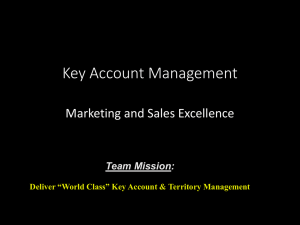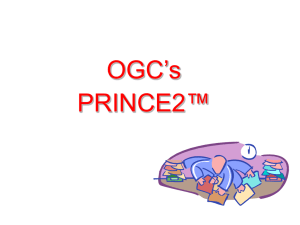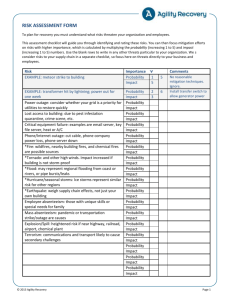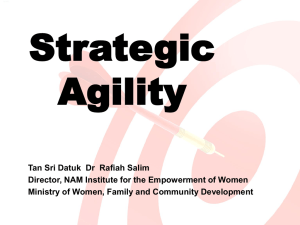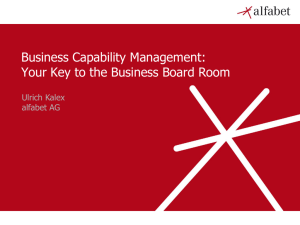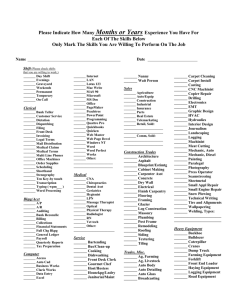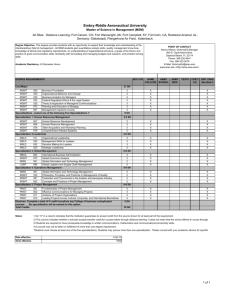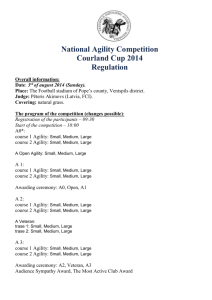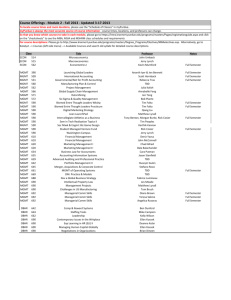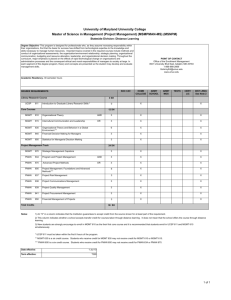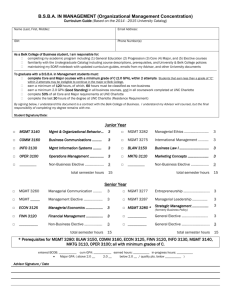Warwick Alcock
advertisement
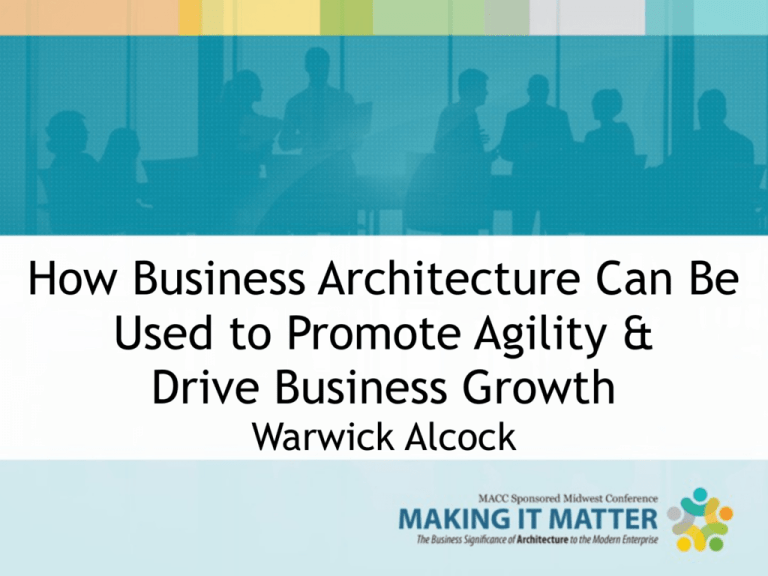
How Business Architecture Can Be Used to Promote Agility & Drive Business Growth Warwick Alcock Outline 1. Introduction 2. Definitions 3. Performance Framework 4. Approaches to Agility & Innovation 5. Implications for Business Architecture 6. Q&A 2 11/13/14 2014 MACC CONFERENCE | MAKING IT MATTER Introduction • • • • • Retail / Supply Chain Financial Services Education Health Care Non-Profits Common Themes • Modeling Disciplines • Performance Mgmt. • Agility, Innovation, Speed 3 Results Significantly more profitable than incremental improvements Definitions Adaptability - Effective response to market turbulence Breakthrough Performance - Customer value, Market share Agility Innovation Speed Swiftness & Responsiveness - Productivity, scalability, service 4 Performance Framework # Acknowledgements BIZBOK 3.7 Business Performance Mgmt. 5 • Strategy Key Partners Strategic Agility Key Activities Key Resources Cost Structures Value Proposition Customer Relationships Customer Segments Channels RevenueStructures Streams Revenue # BIZBOK 3.3 Business Model Frameworks 6 • Strategy Key Partners Strategic Agility Key Activities Animal Care Artistic Development Key Resources Animals Star performers Refined environment Cost Structures Costly animal maintenance Costly star performer fees Artistic Production Value Proposition Star performers Animal shows Concession sales Multiple arenas Fun & humor Thrill & danger Themes Refined environ. Mutiple product. Music / dance Unique venue Customer Segments Customer Relationships Families only Channels Theater & Opera visitors RevenueStructures Streams Revenue Aisle concession sales Ticket price increase 7 • Customer Innovation Approaches Value Stream 33-50% lower costs Knowledge Development Patient Informing Patient Measures Access Customer-focused Value Chain Diagnose Prepare Intervene Recover Monitor Margin Prevent • • Patient Value Health results & costs Acknowledgements: Porter, M. Redefining Healthcare # BIZBOK 2.5 Value Map Required Skills 8 • Customer Innovation Approaches Customer Job Mapping # Step Customers… Example 1 Define Determine goals & plan resources 2 Locate Gather items & info needed to do the job 3 Prepare Set up the environment to do the job 4 Confirm Verify readiness to do the job etc. 5 Execute Carry out the job etc. 6 Monitor Assess for successfull execution 7 Modify Adjust to improve execution 8 Conclude Finish the job or prepare to repeat 9 Troubleshoot Troubleshoot problems that may arise System updates 9 • Process Innovation Approaches Pace Layers • • Innovation • Differentiation • • • • Foundation • • • • Rapid change Experimental apps Agility & Speed e.g. Social networks; smart devices Adaptive change Competitive differentiators Brand drivers Slow evolution Industry practices Compliance e.g. Financial Records 10 • People Innovation Approaches Innovation Teams Purpose Cross-functional, innovation catalysts & design thinkers that address high priority problems, help work teams prototype, run experiments & learn from customers • Goals • • • Approach Results Institutionalization • • 600 experiments per year. Produce 18 high-impact wins per year. NPS 80%+. ‘Painstorm' - identify customers greatest pain-points Brainstorm, prototype & test solutions Code-jam - ‘Good enough’ code to take to customers within a week, pilot, rollout. In Year 1, 32 ideas made it to market. Innovation BOK / Training 11 • Values Innovation Approaches Culture Change From • Management • Internal focus • Quality = Lean • Zero defects • Push • Hiring to a box • Human resources • Carrots & Sticks • Top-down autocracy • Distrust / resentment • Withholding ideas • Disengagement To • Leadership • External focus • Quality = Innovation • Experiments • Pull (Flow) • Hiring to a vision • Human beings • Minds & hearts • Collective wisdom • Trust / commitment • Willing contribution • Engagement 12 Implications for Bus. Arch. Ideas for Consideration Strategy Mgmt Business Modeling Emergent Strategy & Planning Organization Alignment Culture Mgmt. Portfolio Mgmt. Investment Monitoring & Prioritization Funding Reallocation Talent Mgmt. & Redeployment Agile Development Product & Process Mgmt. Customer Job-Mapping 3D Printing Mass Personalization Pace Layer Mgmt Innovation Team Mgmt. Innovation Team Leadership Hiring for Innovation Innovation Team Develop & Deployment Innovation Techniques ‘Tiger Team’ Rapid Deployment Innovation Performance Management Org. Learning Market Analysis Customer Feedback Analysis Personnel Feedback Analysis Process Feedback Analysis Benchmarking Gap Analysis Learn. Integration & Improvement Performance Mgmt. 13 Recommendations 1. Keep portfolio of business capabilities up to date, esp. linkages. 2. Prepare agility/innovation heat maps & gap analyses. 3. Build innovation capabilities that offer a leap in value & amplify performance drivers. Goal: breakthrough performance 14 Agility, Innovation & Speed Q&A 15 For further information, contact Warwick Alcock at warwick@agilityfirst.com 16
